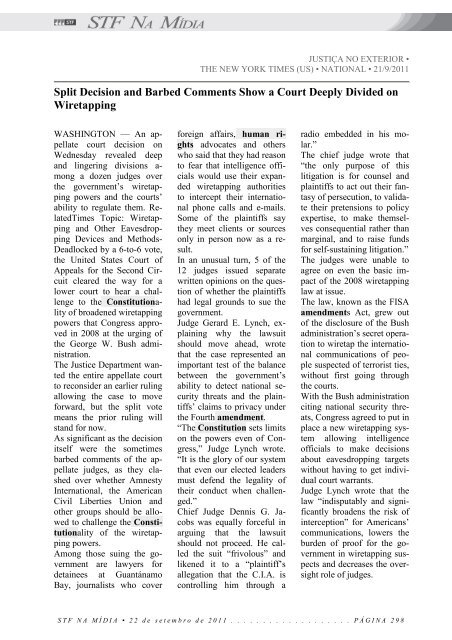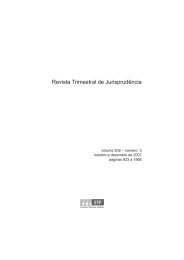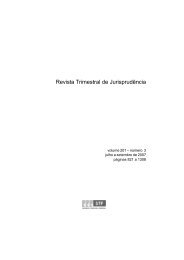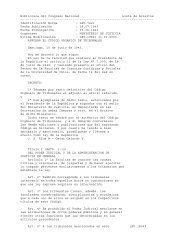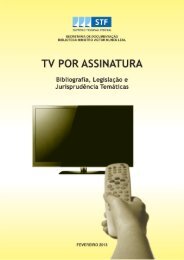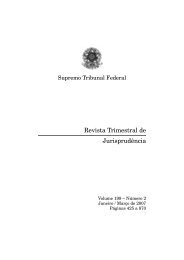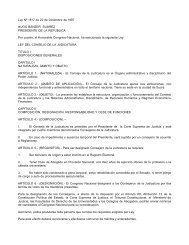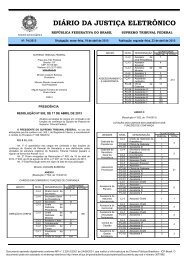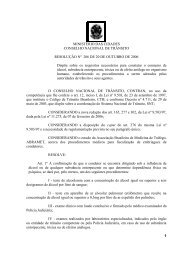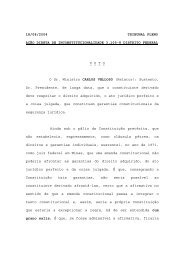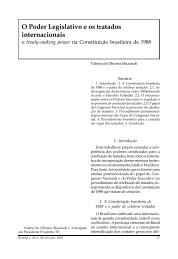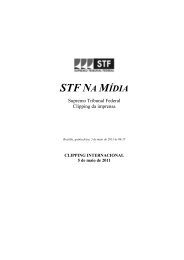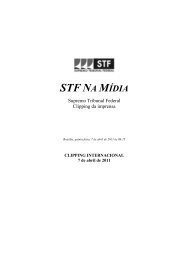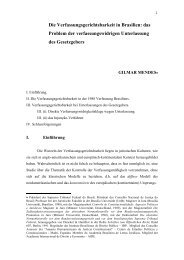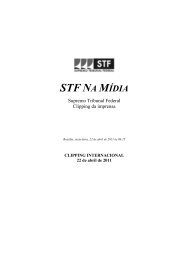STF NA MÍDIA
STF NA MÍDIA
STF NA MÍDIA
You also want an ePaper? Increase the reach of your titles
YUMPU automatically turns print PDFs into web optimized ePapers that Google loves.
JUSTIÇA NO EXTERIOR •<br />
THE NEW YORK TIMES (US) • <strong>NA</strong>TIO<strong>NA</strong>L • 21/9/2011<br />
Split Decision and Barbed Comments Show a Court Deeply Divided on<br />
Wiretapping<br />
WASHINGTON — An appellate<br />
court decision on<br />
Wednesday revealed deep<br />
and lingering divisions a-<br />
mong a dozen judges over<br />
the government’s wiretapping<br />
powers and the courts’<br />
ability to regulate them. RelatedTimes<br />
Topic: Wiretapping<br />
and Other Eavesdropping<br />
Devices and Methods-<br />
Deadlocked by a 6-to-6 vote,<br />
the United States Court of<br />
Appeals for the Second Circuit<br />
cleared the way for a<br />
lower court to hear a challenge<br />
to the Constitutionality<br />
of broadened wiretapping<br />
powers that Congress approved<br />
in 2008 at the urging of<br />
the George W. Bush administration.<br />
The Justice Department wanted<br />
the entire appellate court<br />
to reconsider an earlier ruling<br />
allowing the case to move<br />
forward, but the split vote<br />
means the prior ruling will<br />
stand for now.<br />
As significant as the decision<br />
itself were the sometimes<br />
barbed comments of the appellate<br />
judges, as they clashed<br />
over whether Amnesty<br />
International, the American<br />
Civil Liberties Union and<br />
other groups should be allowed<br />
to challenge the Constitutionality<br />
of the wiretapping<br />
powers.<br />
Among those suing the government<br />
are lawyers for<br />
detainees at Guantánamo<br />
Bay, journalists who cover<br />
foreign affairs, human rights<br />
advocates and others<br />
who said that they had reason<br />
to fear that intelligence officials<br />
would use their expanded<br />
wiretapping authorities<br />
to intercept their international<br />
phone calls and e-mails.<br />
Some of the plaintiffs say<br />
they meet clients or sources<br />
only in person now as a result.<br />
In an unusual turn, 5 of the<br />
12 judges issued separate<br />
written opinions on the question<br />
of whether the plaintiffs<br />
had legal grounds to sue the<br />
government.<br />
Judge Gerard E. Lynch, explaining<br />
why the lawsuit<br />
should move ahead, wrote<br />
that the case represented an<br />
important test of the balance<br />
between the government’s<br />
ability to detect national security<br />
threats and the plaintiffs’<br />
claims to privacy under<br />
the Fourth amendment.<br />
“The Constitution sets limits<br />
on the powers even of Congress,”<br />
Judge Lynch wrote.<br />
“It is the glory of our system<br />
that even our elected leaders<br />
must defend the legality of<br />
their conduct when challenged.”<br />
Chief Judge Dennis G. Jacobs<br />
was equally forceful in<br />
arguing that the lawsuit<br />
should not proceed. He called<br />
the suit “frivolous” and<br />
likened it to a “plaintiff’s<br />
allegation that the C.I.A. is<br />
controlling him through a<br />
radio embedded in his molar.”<br />
The chief judge wrote that<br />
“the only purpose of this<br />
litigation is for counsel and<br />
plaintiffs to act out their fantasy<br />
of persecution, to validate<br />
their pretensions to policy<br />
expertise, to make themselves<br />
consequential rather than<br />
marginal, and to raise funds<br />
for self-sustaining litigation.”<br />
The judges were unable to<br />
agree on even the basic impact<br />
of the 2008 wiretapping<br />
law at issue.<br />
The law, known as the FISA<br />
amendments Act, grew out<br />
of the disclosure of the Bush<br />
administration’s secret operation<br />
to wiretap the international<br />
communications of people<br />
suspected of terrorist ties,<br />
without first going through<br />
the courts.<br />
With the Bush administration<br />
citing national security threats,<br />
Congress agreed to put in<br />
place a new wiretapping system<br />
allowing intelligence<br />
officials to make decisions<br />
about eavesdropping targets<br />
without having to get individual<br />
court warrants.<br />
Judge Lynch wrote that the<br />
law “indisputably and significantly<br />
broadens the risk of<br />
interception” for Americans’<br />
communications, lowers the<br />
burden of proof for the government<br />
in wiretapping suspects<br />
and decreases the oversight<br />
role of judges.<br />
S T F N A M Í D I A • 2 2 d e s e t e m b r o d e 2 0 1 1 . . . . . . . . . . . . . . . . . . . P Á G I N A 2 9 8


